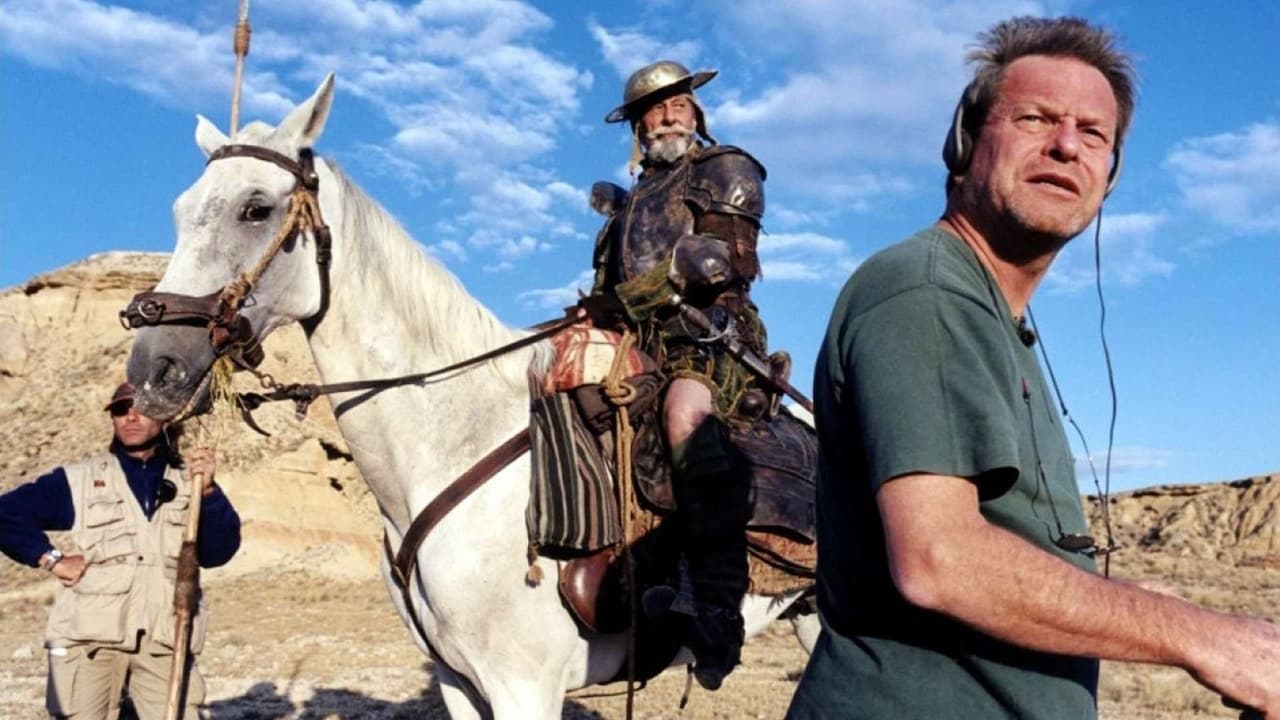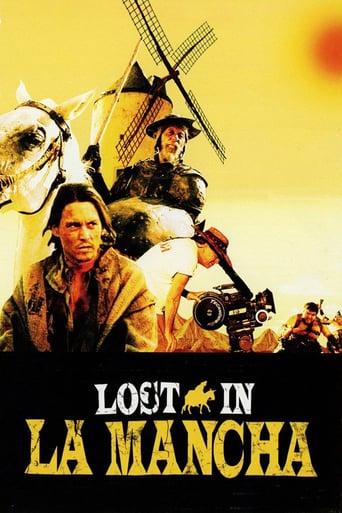

I like the storyline of this show,it attract me so much
... View MoreToo many fans seem to be blown away
... View MoreIt is a performances centric movie
... View MoreAlthough it has its amusing moments, in eneral the plot does not convince.
... View MoreI came to this after watching the finally finished Gilliam's Quijote. It probably works better to watch this one, the "sketch", the "failed attempt", after you saw the finished product. That film, the finished one, is imperfect and chaotic. And that's good. It it as a film, what it was as a work in progress. It reveals Gilliam, and has a special place in his carrer. It's the final product of an obsession, and it follows the path of its very theme.This one is nice, because we see in it some of the anchors that were kept in the later finished film, and that would probably have worked better in the original, at least from a cinematic point of view. It is clear that Gilliam had in mind the replacement of the "book layers" of the original Quijote by the layers of films in films. In other words, he wanted a world where several layers of paralel realities would affect each other, contaminate them, blur them. This is something he has been doing all his life as a filmmaker, and as such it is apt that he adapts Quijote. In the book, at least in my reading, Sancho is the pivot, he is the articulation of all the layers, the one that keeps all the madness tolerable, and the one who places us, the "viewers" in the narrative. So having Johnny Depp play that role would have been magnificient. We can only imagine how it would have been, watching the few conversations between Gilliam and Depp in this documentary, watching the short bits of footage that were recorded (the fish fight is amazing) and trying to imagine Depp whenever we see Driver.I got the impression that Depp was the one who suggested what is in fact the beginning of the new film. At least the breaking of the 4th wall in the matter of "la nuit américaine". That shows he understands the layers. He is a very fine actor.Take this little film as a piece of a grander puzzle in the mind of an interesting guy. A Quijote film will probably always be better as a sum of bits and pieces, chaos and unreachable goals... This fits. I had a little too much of burocracy (whose fault, who's gonna pay, who should have done what...) and too little of Gilliam's mind. But these documentaries almost always fall on that trap."The Man Who Killed Quijote" was the first film in 2018 that completes a seamingly "lost project". We'll likely get Welles' The Other Side of the Wind later this year.. Year for completions, and probably for disappointments. Welles also had an ongoing Quijote project for half his life. Ah, those windmills...
... View MoreTerry Gilliam has a bittersweet experience with Hollywood. Forever given a relative meagre budget that does not do justice with his visual ambitions and always having to compromise in his storytelling.Lost in La Mancha was intended to be a big budget European funded film that would be an updated adaptation of the Don Quixote story. Watching Gilliam here, it strikes you that he looks like a thinner version of Orson Welles, a filmmaker who himself had problems making his own version of the story some decades ago.Gilliam got veteran French actor Jean Rochefort for the central role, he spent months learning English and he could ride a horse but he also suffered from ill health just as soon as filming began. To attract the younger crowd and guarantee funding, Johnny Depp also agreed to appear in this film but his shooting was restricted because the extras had not gone through rehearsals.This documentary about the making of the aborted film is all that survives of 'The Man Who Killed Don Quixote.' A cursed production hit by foul weather in the Spanish desert and then the illness of the star. The allocated budget had little margin for error and they were behind after the first week of filming.At one point Gilliam is called Captain Chaos, but he just solemnly looks out to the horizon as he figures how to deal with the latest calamity. Even the studios hired in Madrid is just a warehouse with bad acoustics.The documentary is a study of how films are made and how disaster can easily strike. Yet one cannot help feeling, especially as we see the scenes with the 'giants' which Gilliam thinks is fantastic that maybe he himself got a lucky escape from a film that was likely to get a critical mauling.
... View MoreMaverick filmmaker Terry Gilliam may have been the mastermind behind such great works as "Brazil" and "The Fisher King", but he created his largest, most brilliantly conceived undertaking to date with 2001's "The Man who Killed Don Quixote". Oh, wait. You've never heard of it? The stellar documentary "Lost in La Mancha" will present precisely why Gilliam's big budget indie flick went from one cataclysm to another without missing a beat. Like Orson Welles before him, Quixotic director Gilliam struggled against immovable and unpreventable odds to get his vision of Quixote to the screen, even after having put more than a full decade's work into it. The film that began as an on-set making of featurette soon blossoms into a movie-making parody no one bothered to pen. It could be said that independent film-making constitutes the bulk of the actual output of the 'film industry', and this documentary rings quite true of those struggling in the trenches of it. It's a wonderful crash course in film-making for those prepared to see the darker, sadder side of it.
... View MoreLOST IN LA MANCHA may not be in the same league as HEARTS OF DARKNESS ( The documentary that gives the inside story of the making of APOCALYPSE NOW ) but it's certainly entertaining and stands as a very good example of how not to produce a movie . I may make myself unpopular for saying this but didn't the people involved deserve everything they got ? Terry Gilliam decides he's going to direct a movie called THE MAN WHO KILLED DON QUIXOTE , it's going to feature windmills , giants and some old self deluded bloke from Spain . Perhaps not the greatest plot for a movie but Johnny Depp is cast as the eponymous man so I guess Gilliam got that bit right since Depp has massive box office appeal . With hindsight that's the only thing Gilliam has done right because he soon finds himself having to use what is probably the worst sound stage in Europe since it's the only one available . Things move from bad to worse when Gilliam finds himself with no one to play Don Quixote on the first day of filming and when they finally cast the actor in the part they realise that the only place that location filming can take place is being used by NATO aircraft for training exercises . It's kind of difficult to have a story set in the 16th century when F-16s are flying over head all day . Things move from worse to even worse when a lot of equipment floats away in a flash flood . What else can go wrong you ask ? This is highly entertaining but no one on the production deserves any sympathy . Didn't the producer research what sound stages would be available during filming ? Didn't he research locations and find one that wasn't being used by NATO or suffered from flash floods ? Couldn't he have cast an elderly actor ( A senor citizen ? ) as Quixoite before shooting was due to begin ? These are the faults of the producer rather than the director but Gilliam isn't entirely blameless himself but perhaps his major fault is that he's too much of a nice guy , he never gets angry and treats every setback with a wry smile which isn't perhaps an attribute for a movie director , compare his manner with Francis Ford Coppola while making APOCALYPSE NOW . As I said this is a perfect example - And a very entertaining one too - on how not to make a movie
... View More